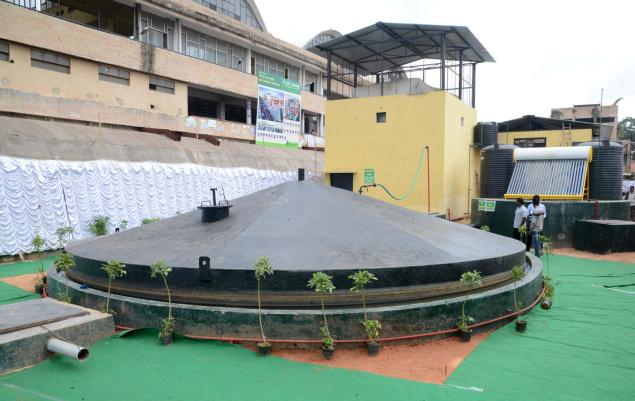
One of the oldest markets in the city, K. R. Market, will now be lit up through electricity generated from waste generated within the market.
About 100 bulbs in the market premises will be powered by the electricity generated from the bio-methanation plant, which was inaugurated on Monday.
Mayor B.S. Sathyanarayana said that the plant, which converts bio-degradable waste into energy, would process five tonnes of wet waste per day to generate electricity that could light up 100 bulbs in the market premises. It would also require 5000 litres of water per day.
“The market would produce several tonnes of wet waste per day. With this plant running, the waste that goes out of the market would also reduce,” he said.
He also said that similar plants would be set up in 18 other places. “The plants in Yelahanka, Matikere and Jayanagar are almost ready and functional and would be formally inaugurated soon,” he said. The total cost of the plant at K.R. Market is Rs. 102.25 lakh and has been outsourced to a private company
The plant was inaugurated by Union Minister for Chemicals and Fertilizers Ananth Kumar in presence of Bangalore district in charge Minister Ramalinga Reddy, Mr. Sathyanarayana and Bruhat Bangalore Mahanagara Palike (BBMP) Commissioner M. Lakshminarayana among others.
Mr. Ananth Kumar said that the Union government, the State government and the local body could work together to solve the city’s garbage crisis. “The Union government would set up waste to compost project in 500 cities and towns across the country. It can be set up in Bangalore too,” he said and urged the Mayor and the BBMP commissioner to tie up with the Union government to work in waste processing projects. He urged the BBMP to create a master plan to tackle a garbage crisis in the city.
Stating that 49 million tonnes of chemical fertilisers were used by farmers in the country, he said that there was a need to reduce the dependence on chemical fertilizers and use organic manure as well. “We also procure chemical fertilizers from abroad and there is a need to reduce it,” he said.


